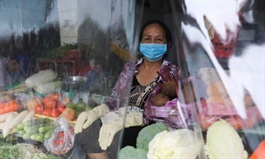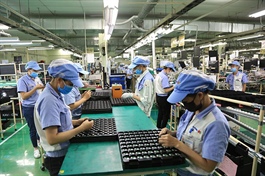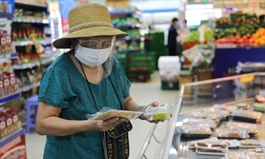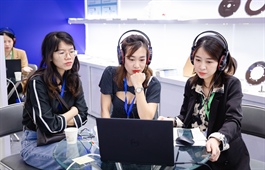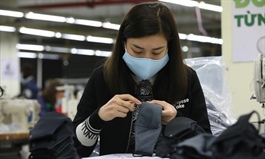How execs led business through Covid-19 wave
How execs led business through Covid-19 wave
Living with workers inside factories, meeting until midnight, and tackling unprecedented issues were some of the unforgettable experiences of business leaders during the fourth Covid-19 wave.
The first Covid-19 cases identified at dry fruit producer Vinamit’s facilities in southern Vietnam in early June began four months of constant tension for the company.
The following months were filled with Covid-focused meetings, while the usual business agenda was left to just a few minutes of discussion, said CEO Nguyen Lam Vien.
Limiting interaction with customers and imposing a stay-at-work model at factories in Binh Duong and Kien Giang were how the company dealt with these difficulties, he said.
"In many meetings we only debated how to stop the contagion."
Also in June, food producer Vissan began to set up accommodation to impose a stay-at-work scheme after detecting several cases among its 1,500 employees.
"We immediately brought them to quarantine facilities," said CEO Vissan Nguyen Ngoc An.
As many quarantine facilities were packed at the time, workers who came into contact with Covid-19 cases remained within the factory. Company leaders also stayed there.
The leaders met for seven days until midnight. By the end of July, as the number of cases reached triple-digits, Vissan let healthy workers return home, before calling 500 of them back the next day to keep production going.
As one of the main pork suppliers to Ho Chi Minh City, company leaders mobilized northern factories and suppliers to keep the supply chain working.
"That was the most difficult time for us ever."
Egg producer Ba Huan experienced similar challenges.
Pham Thi Huan, chairwoman and CEO, said that in her 50 years in the industry, the fourth Covid-19 wave was the most severe interruption, as the company went through four months of loss.
The stay-at-work model increased costs by 50 percent, while rising prices of animal feed and transportation forced Ba Huan to sell its eggs at a loss.
While other egg producers hiked prices, Huan decided to keep the rates unchanged and maintained job stability as a way to give back to the community.
Retail chains also suffered.
In his 14 years at supermarket chain Saigon Co.op, CEO Nguyen Anh Duc said that the fourth wave has caused the most hardship for company leaders.
Labor shortage was a burden for the company. Some outlets were forced to close as workers tested positive.
The company had to mobilize taxis and small trucks to deliver goods, which was unprecedented.
There was a time when the company had only a week to provide a large order of grocery packages as ordered by the government.
"That was an valuable lesson that we could only learn because of the pandemic," Duc said.
For e-commerce platforms, the last four months was not easy.
Nguyen Dac Viet Dung, Sendo chairman, said online platforms acted as a marketplace for essential items during social distancing.
"There were big challenges to maintain service amid disruption in transport and supply chains."
There was a time when one of the suppliers did not pack vegetables well, which could result in crushed products on delivery, Dung said.
Dozens of employees, including office workers, volunteered to show up at the storage facility and worked all night to ensure hundreds of customers get what they ordered, he said.
All these burdens were partly lifted when HCMC decided to resume most activities on Oct. 1 and lift restrictions imposed earlier so businesses could partly reopen.
This helped companies like Ba Huan and Vissan stabilize production. Both companies are confident they would have enough supply to meet an expected rise in orders during the Lunar New Year Tet holiday next February.
Dung of Sendo said the e-commerce market would play a crucial role in economic recovery.



